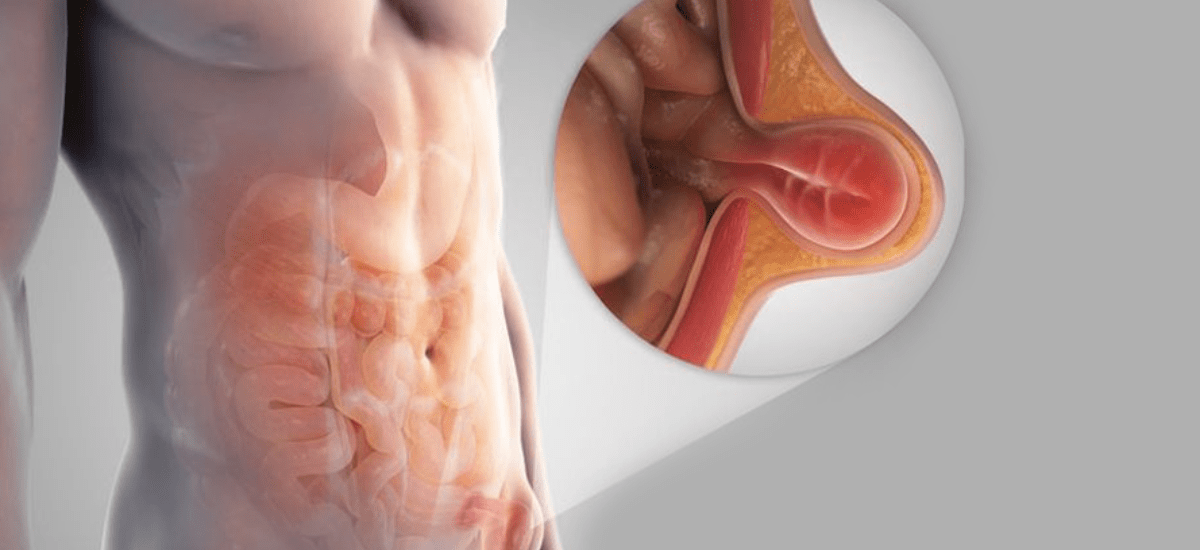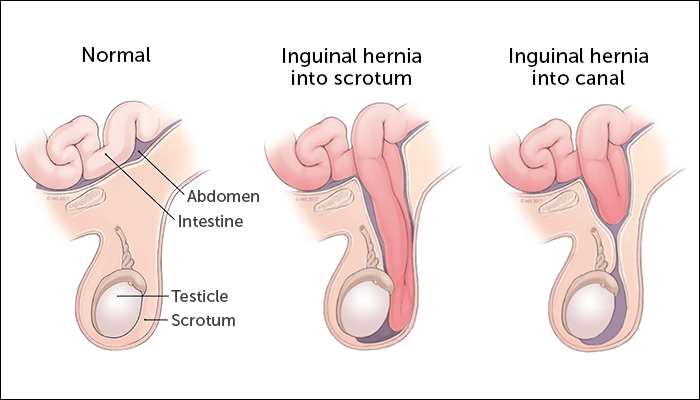Laparoscopic Inguinal Hernia Surgery in Hyderabad

A hernia is a common condition in which an organ or fatty tissue protrudes through a weak point in the surrounding muscle or connective tissue that keeps it in place. The condition can occur in various parts of the body, but most commonly occur in the abdomen, particularly in the groin (the area where the abdomen meets the thigh).
Peruse this blog by Dr Dinesh Reddy, who is the best hernia surgeon in Hyderabad with experience in hernia repair, GI disease management and post operative care, to learn about the various types of hernia, their symptoms and their treatment through laparoscopic surgeries or open surgery. In this blog, Dr Dinesh delves into the intricacies of hernia surgery, highlighting common concerns, surgical techniques, and recovery time.
In this blog, we will explore the fundamentals of hernia and hernia treatment. There are several types of hernia, including Inguinal (groin), Femoral (upper thigh), Umbilical (belly button), Hiatal (upper stomach), and Incisional (resulting from a surgical incision). Symptoms of a hernia can include a visible bulge or lump, pain or discomfort, and a feeling of weakness or pressure in the affected area.
Inguinal hernias are the most common type of hernias, accounting for approximately 75% of all cases.
Inguinal Hernia

An inguinal hernia occurs when the intestines protrude through a weak spot or tear in the lower abdominal wall, typically in the inguinal canal. The inguinal canal is in the groin region and contains the spermatic cord (a bundle of structures that connects the testicles to the rest of the male reproductive system) in males and the round ligament (a band of tissue that helps support the uterus) in females.
In men, the testicles descend through the inguinal canal immediately after birth, and the canal is meant to close almost completely behind them. However, in some cases, the canal does not close properly, leading to a weakened area that can result in an inguinal hernia. Thus, the condition is more common in men.
Common Symptoms Of Inguinal Hernia
Inguinal hernias are typically identified by their visible bulge in the groin area that may become more prominent when standing or coughing. Some other common symptoms of inguinal hernia include:
- Pain or sensitivity in the affected area
- Discomfort or burning sensations
- Sharp pain, especially when straining or lifting heavy objects
- Pressure in the groin
- Swelling or bulging in the scrotum in men

Inguinal hernias are generally not considered dangerous, but they do not usually improve on their own. If left untreated they can lead to potentially life-threatening complications. For this reason, a doctor may recommend hernia surgery to correct an inguinal hernia that is causing pain or increasing in size.
Inguinal Hernia Treatment in Hyderabad
Surgery is the most effective way to treat inguinal hernia. While this may sound intimidating, it is a very common surgery and has a high success rate. Whether you opt for laparoscopic hernia surgery or open hernia surgery, it is important to have a well-trained surgeon perform the procedure for the best possible outcome. Dr K V Dinesh Reddy is the best inguinal hernia surgeon in Hyderabad. His area of expertise lies in diagnosing and treating both simple and complex hernias.
Here are two common surgical options for the treatment of inguinal hernia:
- Open hernia surgery: This procedure involves making a larger incision near the groin to repair the hernia.
- Laparoscopic hernia surgery: This technique is minimally invasive and involves making several small incisions in the abdomen. An instrument called laparoscope is used during the surgery, which is a thin tube with a camera and light at the end.

Laparoscopic Inguinal Hernia Surgery in Hyderabad
During the Procedure
Laparoscopic hernia surgery is done under general anaesthesia (you will remain unconscious during surgery). The surgeon makes several small incisions either in or below the navel. The abdomen is inflated with air to provide a better view of the internal organs.A laparoscope is then inserted through an incision. With the help of the camera, the surgeon can guide the placement of small instruments through other incisions to repair the hernia.
Depending on the type and severity of the hernia, the surgeon may choose to use mesh to strengthen the abdominal wall or stitch together healthy tissue around the affected area. After the structures have been correctly positioned, the surgeon will close the incision using one of several methods, such as sutures, staples, or adhesive glue.
Laparoscopic Inguinal Hernia Surgery typically lasts for approximately 30 to 45 minutes. Normally, patients can return home on the same day after their surgery. However, patients who have other medical issues may need to stay in the hospital overnight.
Recovery Time of Laparoscopic Hernia Surgery
Laparoscopic Inguinal Hernia Surgery is known to have a faster recovery time than traditional open surgery. You will probably be able to get back to your normal activities in 1 to 2 weeks. However, it is important to avoid any strenuous exercise or physical activities that may strain the surgical site for at least 4 weeks after the surgery. This will ensure proper healing and decrease the chances of complications.
Advantages of Laparoscopic Hernia Surgery
- Reduced Recovery Time
- Less Pain and Discomfort
- Minimal Scarring
- Lower Risk of Infection
- Shorter Hospital Stay
- Faster Return to Normal Activities
- Reduced Recurrence Rate

Factors to Consider Before Laparoscopic Hernia Surgery
It is important to note that laparoscopic hernia surgery may not be suitable for everyone. Here are some situations where it may not be recommended:
- Those with an incarcerated hernia
- Individuals who cannot tolerate general anaesthesia
- People with bleeding disorders such as haemophilia or immune thrombocytopenic purpura (ITP)
- Individuals taking blood-thinning medication
- Those who have had multiple belly surgeries or have extensive scar tissue
- Patients who have severe lung diseases such as emphysema
- Pregnant women
- Those who are extremely obese
Cost of Laparoscopic Hernia Surgery in Hyderabad
The cost of Laparoscopic Hernia Surgery in Hyderabad may range anywhere from Rs to Rs. We offer affordable Hernia Surgery which is performed by the Best Surgical Gastroenterologist in Hyderabad, Dr K V Dinesh Reddy. A highly skilled and experienced hernia surgeon in Hyderabad known for his exceptional track record in performing successful laparoscopic surgeries.
Best Hernia Surgeon in Hyderabad

Dr. K V Dinesh Reddy
MBBS; MS (Gen.Surg); DNB (Surg.Gastro)
Dr K V Dinesh Reddy is the best hernia surgeon in Hyderabad with over 10 years of experience in hernia treatment.
He has treated hundreds of hernia patients which makes him the best hernia surgeon in Hyderabad and known as the Best Bariatric surgeon in Hyderabad.
He strongly believes that surgery should only be considered as a last resort and prefers a holistic approach to treatment. So, if a disease can be effectively treated with medication, he never recommends surgery.
Frequently Asked Questions
Here are answers to some of the questions you might have about Inguinal Hernia
Laparoscopic hernia surgery is generally safe for most patients, but not suitable for everyone. It’s a minimally invasive procedure where small incisions are made to repair hernias using a camera and small instruments. However, some medical conditions might make this surgery risky, such as severe heart or lung problems. Your doctor will evaluate your health and decide if laparoscopic hernia surgery is a safe option for you. Always consult with your healthcare provider to determine the best course of action based on your individual circumstances.
Recovery time from laparoscopic hernia surgery varies, but most people can return to light activities within a week or two. You might experience some discomfort, swelling, or mild pain during the first few days. Strenuous activities should be avoided for about four to six weeks. Your doctor will provide guidance on when you can resume regular routines. Remember, individual recovery times can differ, influenced by factors like your overall health and the size of the hernia. Follow your doctor’s instructions closely and give yourself the needed time to heal properly. If you have concerns, always consult your healthcare provider.
After a laparoscopic hernia surgery, you’ll likely have small scars, but they’re usually less noticeable than with traditional surgery. The procedure uses tiny incisions, so the scars are smaller and fade over time. These scars might look like small dots on your skin. While they’re not entirely invisible, they often become quite faint as you heal. Taking care of the incisions and following your doctor’s advice can help minimize scarring. Keep in mind that everyone’s healing process is different, but generally, the scars from laparoscopic hernia surgery tend to be less prominent compared to other surgical methods.
Laparoscopic hernia surgery is generally safe, but like any surgery, it carries some risks. Potential complications include infection, bleeding, and damage to nearby structures. There’s also a small chance of hernia recurrence, where the hernia comes back. In rare cases, complications with anesthesia or blood clots can occur. Some people might experience pain or discomfort, and very rarely, issues like bowel injury or nerve damage may happen.
Yes, hernias can potentially come back after laparoscopic repair, but the chances are generally lower compared to traditional surgery. Recurrence can happen if the repaired tissue doesn’t heal properly or if new stress is placed on the area. Factors like a person’s age, overall health, and the type of hernia can influence the risk. Following your doctor’s instructions during recovery, avoiding heavy lifting, and maintaining a healthy lifestyle can help reduce the likelihood of recurrence.


